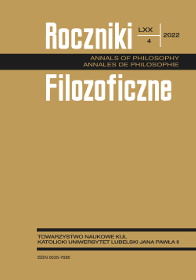Spinoza’s Defense of Toleration: The Argument From Pluralism
Abstract
Spinoza’s bold, spirited defense of toleration is an animating theme of the Theological-Political Treatise (TTP) and an important reason for the significant historical impact of the text. But Spinoza’s arguments for toleration can be challenging to discern. True to its title, the TTP offers two main arguments for toleration, one political, the other theological. This paper argues that Spinoza’s theological argument for toleration is closely connected to a distinct and often overlooked argument from pluralism. This paper examines Spinoza’s argument from pluralism and defends that it is more attractive to similar arguments for toleration offered by Bodin and Bayle. It is more attractive than Bodin’s pluralism argument because Spinoza’s allows that religious beliefs and doctrines of faith have a rational justification, which makes possible a more optimistic picture of the prospects for religious disputation. Spinoza’s pluralism argument is also more attractive than Bayle’s argument because Spinoza’s does not regard religious beliefs as justified by sincerity, which means that he does not need to recognize any problematic rights of erroneous conscience, nor is he forced to accept as justified sincere beliefs in persecution or obviously immoral or irreligious beliefs.
References
Bayle, Pierre. A Philosophical Commentary on These Words of the Gospel, Luke 14.23, “Compel Them to Come In, That My House May Be Full. Edited by John Kilcullen and Chandran Kukathas. Indianapolis: Liberty Fund, 2005.
Blount, Charles. Religio Laici: Written in a Letter to John Dryden. London: R. Bentley and S. Magnus, 1683.
Bodin, Jean. The Six Bookes of a Commonweale. Edited and translated by Richard Knolles. Cambridge, MA: Harvard University Press, 1962.
Bodin, Jean. Colloquium of the Seven about Secrets of the Sublime. Edited by Marion Leathers Kuntz. Princeton, NJ: Princeton University Press, 1975.
Curley, Edwin. “Bayle versus Spinoza on Toleration.” Mededeelingen van wege het Spinozahuis 95 (Leiden: Brill, 2009): 3–30.
Curley, Edwin. “Castellio vs. Spinoza on Religious Toleration.” The Proceedings of the Twentieth World Congress of Philosophy 7 (2010): 89–110.
Forst, Rainer. “Toleration.” In The Stanford Encyclopedia of Philosophy, edited by Edward N. Zalta (Fall 2017 Edition), section 3. https://plato.stanford.edu/archives/fall2017/entries/toleration.
Laerke, Mogens. Spinoza and the Freedom of Philosophizing. Oxford: Oxford University Press, 2021.
Laursen, John Christian. “Baylean Liberalism: Tolerance Requires Nontolerance.” In Beyond the Persecuting Society: Religious Toleration Before the Enlightenment, edited by John Christian Laursen and Cary J. Nederman, 197–215. Philadelphia: University of Pennsylvania Press, 1997.
Remer, Gary. “Bodin’s Pluralistic Theory of Toleration.” In Difference and Dissent: Theories of Tolerance in Medieval and Early Modern Europe, edited by John Christian Laursen and Cary J. Nederman, 119–37. Lanham: Rowman and Littlefield, 1996.
Spinoza, Benedictus. The Collected Works of Spinoza. Vol. 2. Edited and translated by Edwin Curley. Princeton, NJ: Princeton University Press, 2016.
Steinberg, Justin. “Spinoza’s Curious Defense of Toleration.” In Spinoza’s Theological-Political Treatise: A Critical Guide, edited by Yitzhak Melamed and Michael Rosenthal, 210–230. Cambridge: Cambridge University Press, 2010.
Zagorin, Peter. How the Idea of Religious Toleration Came to the West. Princeton, NJ: Princeton University Press, 2005.
Copyright (c) 2022 Roczniki Filozoficzne

This work is licensed under a Creative Commons Attribution-NonCommercial-NoDerivatives 4.0 International License.





